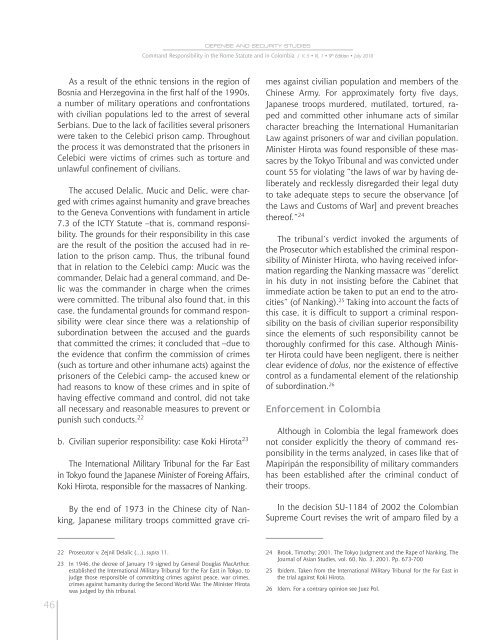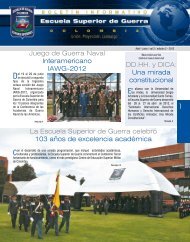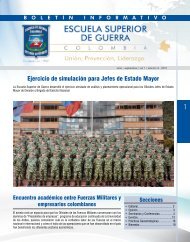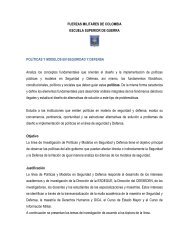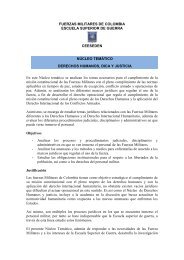Edición No.9 - Escuela Superior de Guerra
Edición No.9 - Escuela Superior de Guerra
Edición No.9 - Escuela Superior de Guerra
- No tags were found...
Create successful ePaper yourself
Turn your PDF publications into a flip-book with our unique Google optimized e-Paper software.
DEFENSE AND SECURITY STUDIES<br />
Command Responsibility in the Rome Statute and in Colombia / V. 5 • N. 1 • 9 th Edition • July 2010<br />
As a result of the ethnic tensions in the region of<br />
Bosnia and Herzegovina in the rst half of the 1990s,<br />
a number of military operations and confrontations<br />
with civilian populations led to the arrest of several<br />
Serbians. Due to the lack of facilities several prisoners<br />
were taken to the Celebici prison camp. Throughout<br />
the process it was <strong>de</strong>monstrated that the prisoners in<br />
Celebici were victims of crimes such as torture and<br />
unlawful connement of civilians.<br />
The accused Delalic, Mucic and Delic, were charged<br />
with crimes against humanity and grave breaches<br />
to the Geneva Conventions with fundament in article<br />
7.3 of the ICTY Statute –that is, command responsibility.<br />
The grounds for their responsibility in this case<br />
are the result of the position the accused had in relation<br />
to the prison camp. Thus, the tribunal found<br />
that in relation to the Celebici camp: Mucic was the<br />
comman<strong>de</strong>r, Delaic had a general command, and Delic<br />
was the comman<strong>de</strong>r in charge when the crimes<br />
were committed. The tribunal also found that, in this<br />
case, the fundamental grounds for command responsibility<br />
were clear since there was a relationship of<br />
subordination between the accused and the guards<br />
that committed the crimes; it conclu<strong>de</strong>d that –due to<br />
the evi<strong>de</strong>nce that conrm the commission of crimes<br />
(such as torture and other inhumane acts) against the<br />
prisoners of the Celebici camp- the accused knew or<br />
had reasons to know of these crimes and in spite of<br />
having effective command and control, did not take<br />
all necessary and reasonable measures to prevent or<br />
punish such conducts. 22<br />
b. Civilian superior responsibility: case Koki Hirota 23<br />
The International Military Tribunal for the Far East<br />
in Tokyo found the Japanese Minister of Foreing Affairs,<br />
Koki Hirota, responsible for the massacres of Nanking.<br />
By the end of 1973 in the Chinese city of Nanking,<br />
Japanese military troops committed grave crimes<br />
against civilian population and members of the<br />
Chinese Army. For approximately forty ve days,<br />
Japanese troops mur<strong>de</strong>red, mutilated, tortured, raped<br />
and committed other inhumane acts of similar<br />
character breaching the International Humanitarian<br />
Law against prisoners of war and civilian population.<br />
Minister Hirota was found responsible of these massacres<br />
by the Tokyo Tribunal and was convicted un<strong>de</strong>r<br />
count 55 for violating “the laws of war by having <strong>de</strong>liberately<br />
and recklessly disregar<strong>de</strong>d their legal duty<br />
to take a<strong>de</strong>quate steps to secure the observance [of<br />
the Laws and Customs of War] and prevent breaches<br />
thereof.” 24<br />
The tribunal’s verdict invoked the arguments of<br />
the Prosecutor which established the criminal responsibility<br />
of Minister Hirota, who having received information<br />
regarding the Nanking massacre was “<strong>de</strong>relict<br />
in his duty in not insisting before the Cabinet that<br />
immediate action be taken to put an end to the atrocities”<br />
(of Nanking). 25 Taking into account the facts of<br />
this case, it is difcult to support a criminal responsibility<br />
on the basis of civilian superior responsibility<br />
since the elements of such responsibility cannot be<br />
thoroughly conrmed for this case. Although Minister<br />
Hirota could have been negligent, there is neither<br />
clear evi<strong>de</strong>nce of dolus, nor the existence of effective<br />
control as a fundamental element of the relationship<br />
of subordination. 26<br />
Enforcement in Colombia<br />
Although in Colombia the legal framework does<br />
not consi<strong>de</strong>r explicitly the theory of command responsibility<br />
in the terms analyzed, in cases like that of<br />
Mapiripán the responsibility of military comman<strong>de</strong>rs<br />
has been established after the criminal conduct of<br />
their troops.<br />
In the <strong>de</strong>cision SU-1184 of 2002 the Colombian<br />
Supreme Court revises the writ of amparo led by a<br />
46<br />
22 Prosecutor v. Zejnil Delalic (…), supra 11.<br />
23 In 1946, the <strong>de</strong>cree of January 19 signed by General Douglas MacArthur,<br />
established the International Military Tribunal for the Far East in Tokyo, to<br />
judge those responsible of committing crimes against peace, war crimes,<br />
crimes against humanity during the Second World War. The Minister Hirota<br />
was judged by this tribunal.<br />
24 Brook, Timothy; 2001. The Tokyo Judgment and the Rape of Nanking, The<br />
Journal of Asian Studies, vol. 60, No. 3, 2001. Pp. 673-700<br />
25 Ibí<strong>de</strong>m. Taken from the International Military Tribunal for the Far East in<br />
the trial against Koki Hirota.<br />
26 I<strong>de</strong>m. For a contrary opinion see Juez Pol.


